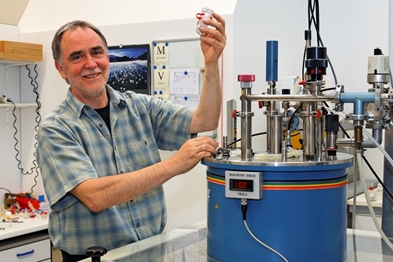You are here
Eckhard Bill (1953-2022)
Eckhard Bill (1953-2022)

Eckhard Bill studied physics at the University of Saarland and became enthusiastic about Mössbauer spectroscopy already during his studies. He was one of the first students of Alfred (Ali) Trautwein, who did his habilitation in the group of Uli Gonser and then accepted the call for a professorship at the University of Lübeck in 1983.
Enthusiastic about his young student, Ali Trautwein offered Eckhard to work with him in Lübeck and set up a laboratory for Mössbauer spectroscopy there. Thus, in a short time, Eckhard attained the position of laboratory manager, who, with his extensive experimental expertise, supervised a large number of measuring stations for Mössbauer spectroscopy at low temperatures and high magnetic fields.
Eckhard was fascinated by biological and chemical systems in which iron centers have functional roles such as catalysis and transport. His dissertation, still completed at Saarland University, is entitled "Mössbauer Investigations on the Cofactor Iron of Putadimonooxin." After the establishment of the Mössbauer laboratory at the University of Lübeck was completed, Eckhard established EPR spectroscopy in the group of Ali Trautwein and then also magnetometry in the early 1990s. Eckhard Bill was not only an extremely talented experimentalist, he was always an authority in the interpretation of the obtained measurement results and an expert in the use of the spin Hamiltonian formalism, which can be used to describe magnetic properties of metal centers in proteins and chemical complexes.
In addition to all the scientific work in the laboratory, Eckhard discovered his enthusiasm for sailing and was out on the Baltic Sea as often as time allowed.
Countless collaborations made Eckhard Bill well known not only in the Mössbauer community but also in the bioinorganic community. His friendly and personal way of dealing with people as well as his high level of expertise and immense enthusiasm for science made him a sought-after cooperation partner.
So it was not surprising that Karl Wieghardt offered him in 1995 to set up a laboratory for Mössbauer and EPR spectroscopy at the then Max Planck Institute (later Bioinorganic Chemistry, then Chemical Energy Conversion) for Radiation Chemistry. He then led the Magnetism, Magnetic and Mössbauer Spectroscopy group there in the departments of Karl Wieghardt (1995-2010), Frank Neese (2011-2017), and Serena DeBeer (2018-2020). After his retirement in 2019, Eckhard Bill remained highly active in research and teaching as an advisor to the Institute.
His scientific work is reflected in more than 500 publications. In 2013, he received the IBAME Science Award for his contributions to biological and chemical Mössbauer spectroscopy.
After the Baltic Sea was no longer so close, Eckhard, together with his wife Ute, became enthusiastic about traveling to the vastness of the North African desert landscapes. He certainly still had a lot planned, but suddenly and completely unexpectedly, Eckhard Bill set off on his last journey on October 6, 2022, at the age of 68.
He is greatly missed by all who knew him. Our sympathy goes out to Eckhard Bill's family, especially his wife Ute Czeromin and his daughter Eva Bill.
Volker Schünemann (University of Kaiserslautern)
Frank Neese (Max-Planck-Institut für Kohlenforschung at Mülheim an der Ruhr)
